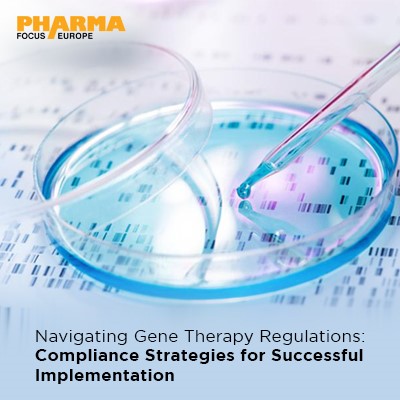
Navigating gene therapy regulations requires a comprehensive approach integrating scientific expertise, regulatory compliance, and ethical considerations. This article explores key compliance strategies, evolving regulatory trends like global harmonization, and innovative pathways to ensure safe and ethical implementation while improving patient access to transformative gene therapies.

Gene therapy holds immense promise for treating a wide range of genetic disorders and diseases. However, its implementation requires strict adherence to regulatory guidelines to ensure safety, efficacy, and ethical considerations. Navigating gene therapy regulations is crucial for successful integration into healthcare systems worldwide.
Understanding Gene Therapy Regulations
Gene therapy regulations encompass a complex framework that governs research, clinical trials, manufacturing, distribution, and post-market surveillance. Key regulatory bodies include the FDA in the United States, EMA in Europe, and various national regulatory agencies globally. These regulations aim to protect patient safety, ensure product quality, and assess therapeutic efficacy.
Compliance Challenges in Gene Therapy
One of the primary challenges in gene therapy compliance is the dynamic nature of regulations. As scientific knowledge advances and technologies evolve, regulatory frameworks must adapt to address emerging concerns. This necessitates continuous monitoring, updates, and adherence to changing requirements throughout the gene therapy lifecycle.
Key Compliance Strategies
a. Comprehensive Regulatory Assessment: Conduct a thorough analysis of regulatory requirements at each stage, from preclinical research to post-market surveillance. Identify applicable guidelines, standards, and submission processes to streamline regulatory compliance.
b. Quality Management Systems (QMS): Implement robust QMS protocols to ensure adherence to Good Manufacturing Practices (GMP), Good Clinical Practices (GCP), and Good Laboratory Practices (GLP). Establish quality control measures for manufacturing, testing, and documentation.
c. Risk Management: Develop a risk management plan to assess potential hazards, mitigate risks, and enhance patient safety. Identify and address risks related to product efficacy, adverse events, supply chain integrity, and regulatory non-compliance.
d. Clinical Trial Design: Design clinical trials according to regulatory guidelines, including patient selection criteria, informed consent procedures, data collection methods, and monitoring protocols. Adhere to ethical standards and regulatory reporting requirements throughout the trial phases.
e. Regulatory Documentation: Prepare comprehensive regulatory submissions, including Investigational New Drug (IND) applications, Clinical Trial Applications (CTA), Marketing Authorization Applications (MAA), and post-market surveillance reports. Ensure accuracy, completeness, and timely submission to regulatory authorities.
f. Post-Market Surveillance: Implement post-market surveillance strategies to monitor product safety, efficacy, and long-term outcomes. Collect real-world data, conduct pharmacovigilance activities, and comply with adverse event reporting requirements.
Future Trends in Gene Therapy Regulations
The future of gene therapy regulations is expected to focus on harmonization, standardization, and innovation. Collaborative efforts between regulatory agencies, industry stakeholders, and healthcare professionals will drive regulatory convergence, expedite approvals, and improve patient access to innovative therapies.
Evolving Regulatory Landscape
The regulatory landscape for gene therapy is evolving rapidly to keep pace with scientific advancements and the increasing demand for innovative therapies. Regulatory agencies are collaborating globally to harmonize standards, streamline approval processes, and foster innovation while maintaining stringent safety and efficacy standards. This collaboration facilitates knowledge sharing, regulatory convergence, and accelerated access to gene therapies for patients in need.
Global Regulatory Harmonization
Global regulatory harmonization is a key trend in gene therapy regulations, aiming to reduce duplication of efforts, enhance regulatory efficiency, and promote international collaboration. Initiatives such as the International Council for Harmonization of Technical Requirements for Pharmaceuticals for Human Use (ICH) bring together regulatory authorities from major pharmaceutical markets to develop harmonized guidelines for drug development, including gene therapies.
Standardization of Regulatory Requirements
Standardization of regulatory requirements is essential for ensuring consistency, clarity, and predictability in the regulatory process. Regulatory agencies are working towards harmonizing definitions, terminology, data requirements, and submission formats to facilitate efficient review and approval of gene therapy products. This standardization promotes transparency, reduces regulatory burden, and accelerates time-to-market for innovative therapies.
Innovative Regulatory Pathways
Regulatory agencies are exploring innovative regulatory pathways to expedite the development and approval of gene therapies for rare diseases and unmet medical needs. Accelerated review programs, such as the FDA's Breakthrough Therapy Designation and EMA's Priority Medicines (PRIME) scheme, prioritize regulatory review for promising therapies, allowing faster access for patients while maintaining rigorous safety and efficacy standards.
Regulatory Challenges and Solutions
Despite the progress in gene therapy regulations, challenges remain, including manufacturing complexities, long-term safety monitoring, pricing and reimbursement strategies, and ethical considerations. Addressing these challenges requires collaborative efforts between regulators, industry stakeholders, healthcare providers, and patient advocates.
Ethical Considerations
Ethical considerations play a crucial role in gene therapy regulations, particularly regarding patient autonomy, informed consent, privacy, and equity in access. Regulatory frameworks must uphold ethical principles, protect patient rights, and ensure equitable access to gene therapies for all eligible patients, regardless of socio-economic factors.
Navigating gene therapy regulations requires a multi-disciplinary approach, encompassing scientific expertise, regulatory knowledge, ethical considerations, and stakeholder collaboration. By embracing global regulatory harmonization, standardization of requirements, innovative regulatory pathways, and proactive risk management strategies, the gene therapy industry can overcome regulatory challenges, accelerate access to transformative therapies, and improve patient outcomes. Regulatory compliance remains paramount in ensuring the safe, effective, and ethical implementation of gene therapy solutions for patients worldwide.